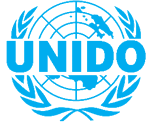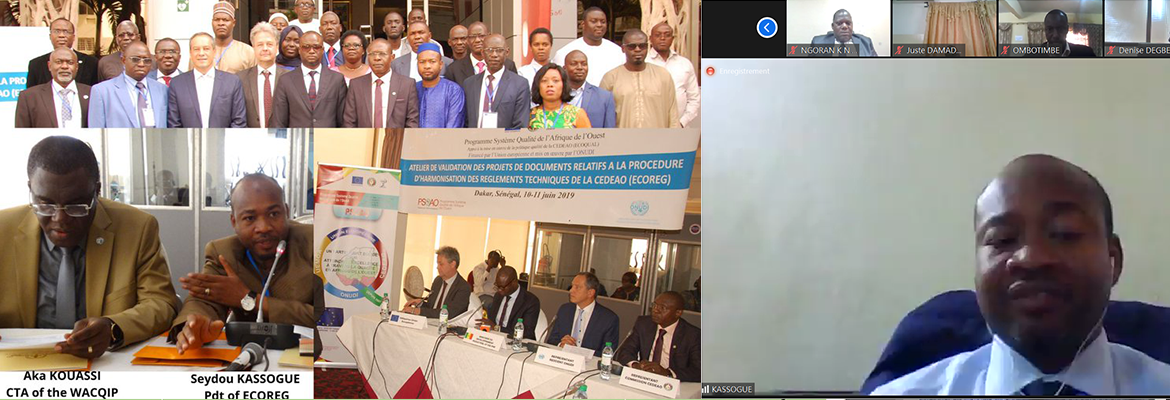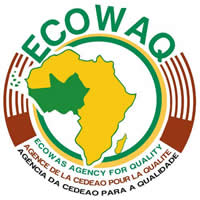





The members of the Community Committee on Technical Regulations (CCTR/ECOREG) of the ECOWAS Member States met on 27 and 28 October 2020 to validate technical regulations relating to four (04) draft implementing regulations on regional standards for electrical appliances and equipment.
The workshop was organized in two (2) sessions attended by representatives of the ECOWAS Commission, the ECOWAS Centre for Renewable Energy and Energy Efficiency (ECREEEE), the Improved Governance of the Renewable Energy and Energy Efficiency Sector in West Africa Project (AGOSEREE-WA) and the West Africa Competitiveness and Quality Infrastructure Project (WACOMP-WACQIP).
On the sidelines of this meeting, the Président of the CCTR/ECOREG, Mr. Seydou Kassougé, recalled in the interview below, the lessons to be learned.
Interview
WACOMP-WACQIP - Why did ECREEE ask ECOREG to organize the October 27th meeting?
S. KASSOGUE - The solicitation of a committee or any structure in a community activity is based on very precise logic. These logics can be the institutional predisposition of the structure or the contribution it could make in the activity in question in accordance with its missions.
Based on these logics, ECOREG's presence at the October 27th meeting is well justified. In particular, the meeting will examine four draft technical regulations that consist of implementing ECOSTAND standards adopted in collaboration with ECREEE. So, when we talk about standards and technical regulations, we are necessarily talking about quality policy and the institutional mechanism put in place at ECOWAS level to manage the quality infrastructure scheme.
Thus, as you know, Regulation C/REG.19/12/13 which adopted the quality infrastructure scheme is provided for the creation of a community technical regulation committee. This committee will make it possible to harmonize the procedures for opting for technical regulations in ECOWAS member states. In November 2017 in Abuja (Nigeria), the various arms of the said committee were set up by the various member countries, namely the presidency and vice-presidency. On the same occasion, its rules of procedure were adopted. Also, in June 2019 in Dakar, the second meeting of ECOREG members made it possible to adopt the texts governing the procedures for harmonization of technical regulations at ECOWAS level. These texts are awaiting adoption very soon by the Council of Ministers.
As for the regulatory provisions relating to the organization and functioning of ECOREG, Article 16 of Regulation C/REG.9/06/17 stipulates that, pending the operationalization of the Regional Quality Organization, ECOREG's activities shall be implemented within the framework of ECOWAS Quality Programs.
Therefore, the meetings of the Community Committee on Technical Regulations during the transitional period shall focus exclusively on priority issues identified by the Commission and Member States, while ensuring that standards that have been or are in the process of being approved at the regional level are used.
As you can see, the ECREEE's request is easily justified in the light of this last sentence. It is a question of using standards approved at regional level and the four draft regulations proposed by ECREEE are based on ECOSTAND standards.
Also, the harmonization procedure texts, although not adopted by the Council of Ministers, has categorized the sources of technical regulations as A, B and C and ECOSTAND standards are in Category A.
In light of all these elements, it was therefore important that this work to adopt technical regulations be initiated
WACOMP-WACQIP - What were the main outcomes of the meeting?
S. KASSOGUE -Thank you, when you talk about results, you talk about evaluation, and to evaluate well, you need criteria. In relation to the meeting, the criteria could be the agenda of the meeting. Specifically, the purpose was to proceed with the review and adoption of four draft regulations for the application of ECOSTAND standards proposed by ECREEE. These standards are :
- Draft Implementing Regulations for ECOSTAND 071-1: 2017 for ECOWAS Member States on AC-powered refrigeration appliances
- Draft regulation for the implementation of ECOSTAND 071-2-2017 for ECOWAS Member States, relating to residential and commercial air conditioners.
- Draft regulation for the implementation of ECOSTAND 053: 2016 for ECOWAS Member States, relating to technical specifications for service lamps for mains lighting.
- Draft implementing regulation for ECOSTAND 054: 2016 for ECOWAS Member State on technical specifications for off-grid lighting products.
With regards to the review, I believe that the participants without complacency made pertinent observations and the report at the end of the meeting was commendable.
With respect to adoption, all participants unanimously adopted the draft regulations with the understanding that the comments made would be incorporated into the final versions.
Also, in their speeches, ECREEE representatives noted that several standards have been adopted but are not being effectively implemented by member countries. Therefore, the review and adoption of the draft regulations is a start to making these standards mandatory. The adoption of these draft regulations is also an outcome that will harmonize regulations in all countries and consequently reduce barriers to trade in these specific areas.
So, we can say that the benefits of these outcomes are twofold. On the one hand for ECOREG which, for the first time, has been able to review and adopt technical regulations and on the other hand for ECREEE which could make mandatory those sets of adopted standards that have remained unimplemented for a long time.
WACOMP-WACQIP - What significance do you give to this meeting, that follows the Dakar meeting?
S. KASSOGUE -This is a special meaning that I give to this meeting. As a reminder, the first two meetings held by ECOREG successively in Abuja and Dakar were aimed at setting up the instruments for the actual functioning. This involves the establishment of ECOREG's arms and the adoption of the texts that enable the harmonization of regulations.
However, the present meeting signifies the real beginning of ECOREG's operationality because it involves the adoption of four technical regulations. This adoption is part of the guideline for harmonization of regulations which is one of the fundamental missions of ECOREG.
WACOMP-WACQIP - What is the message to the structures and institutions that, like ECREE, can use the ECOREG system?
S. KASSOGUE -The message I am sending is simple as it is also addressed to all stakeholders who are concerned by all the categories of sources of technical regulations (A, B and C) provided for in the harmonization texts. These include the private sector and consumer associations in the ECOWAS zone. I ask them to follow in the footsteps of ECREEE, i.e. to use the ECOREG mechanism. This mechanism exists, it’s operational and has had its "baptism of fire" with the adoption of the draft regulations proposed by ECREEE, if I may put it that way.
Thank you for your questions!
 This program is funded by the European Union with the technical support of UNIDO, the implementing Agency
This program is funded by the European Union with the technical support of UNIDO, the implementing Agency
The views expressed in this publication do not necessarily reflect those of the Commision of the European Union




Copyright - 2019 - ECOWAS AGENCY FOR QUALITY